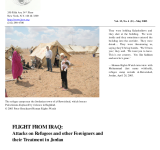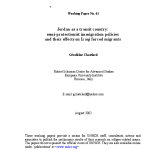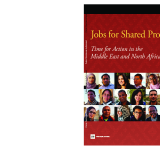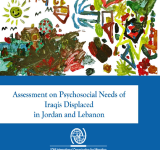Attacks and harassment amidst the security vacuum in Iraq forced refugees and other foreigners to flee the country and become refugees again;; this time in Jordan. Based on research in Baghdad and Jordan;; this 22-page Human Rights Watch report details the abuses against refugees and foreigners in Iraq;; as well as their treatment upon arrival in Jordan. Housing is frequently the pretext for the violence and harassment. Many landlords;; forced by the previous government to take Palestinian tenants at discounted rates;; are taking advantage of the breakdown in law and order to evict Palestinian tenants from their homes or to extort unrealistic rent increases from them. In other cases;; violence and threats have come from individuals who seem to have no legitimate claim to the property. Human Rights Watch criticized Jordanian authorities for limiting refugees' entry to Jordan and recommended that Jordan provide immediate protection and assistance to all refugees;; including those currently trapped near the Jordanian border in accordance with international refugee law standards.



